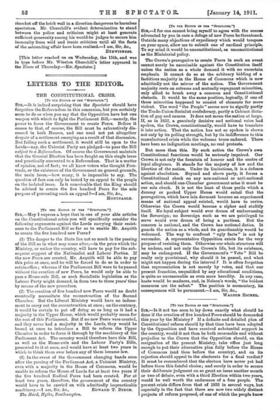[TO THIS EDITOR 07 THII "SPECTATOR.")
SIEj--/ for one cannot bring myself to agree with the course advocated by you in case a deluge of new Peers be threatened. Outside many objections of expediency which would trespass on your space, allow me to submit one of cardinal principle. To my mind it would be unconstitutional, as unconstitutional as the Ministerial policy.
The Crown's prerogative to create Peers in such an event cannot surely be exercisable against the Constitution itself unless the nation as a whole demand it with no uncertain emphasis. It cannot do so at the arbitrary bidding of a factitious majority in the House of Commons which is now admittedly not the mirror of the nation. The Government majority rests on extreme and mutually repugnant minorities, only allied to brush away a common and Constitutional obstacle. It would be the same position, logically, if one of those minorities happened to consist of elements far more violent. The word " the People" seems now to signify partly the Trade-Union-Socialist confederacy, partly a Cabinet dicta- tion of gag and caucus. It does not mean the nation at large. If, as in 1832, a genuinely decisive and national voice had spoken, the Crown, constitutionally, would have to translate it into action. That the nation has not so spoken is shown not only by its polling strength, but by its indifference to this manufactured crisis while the welcome truce endured. There have been no indignation meetings, no real protests.
But more than this. By such action the Crown's own Constitutional functions would be seriously impaired. Our Crown is not only the fountain of honour and the centre of loyal allegiance. It stands for the majesty of law and the liberties of the nation. Under its limitations, it is a defence against absolutism. Beyond and above party, it forms a Constitutional check on any non-national or anti-national action, and should one-Chamber government arise it must be our sole check. It is not the least of those perils which a dummy or packed Upper House would entail that the prerogatives, which have lain dormant because an experienced means of national appeal existed, would have to revive. Otherwise the Crown would become a cipher and stultify itself. No loyal subject would ever dream of embarrassing the Sovereign; no Sovereign such as we are privileged to serve would ever dream of being a partisan. But the concern is national, and the Crown has national duties. It guards the nation as a whole, and its guardianship would be welcomed. The way to confront " ugly facts" is not by surrender. A representative Opposition exists for the very purpose of resisting them. Otherwise our whole structure will be undone, and not only the Crown's life, but its existence, may be endangered. if the Government's " Veto " Bill be really only provisional, why should it be passed, and what might not happen during the interval ? It is often forgotten that representation is not merely by votes, and that our present franchise, unqualified by any educational conditions, is quite as unreasonable as even mere heredity. In any case, haste would be madness, and, in Nelson's words, " the boldest measures are the safest." The position is momentary, its consequences will be permanent.—I am, Sir, (to.,
WALTER SICHEL.






































 Previous page
Previous page